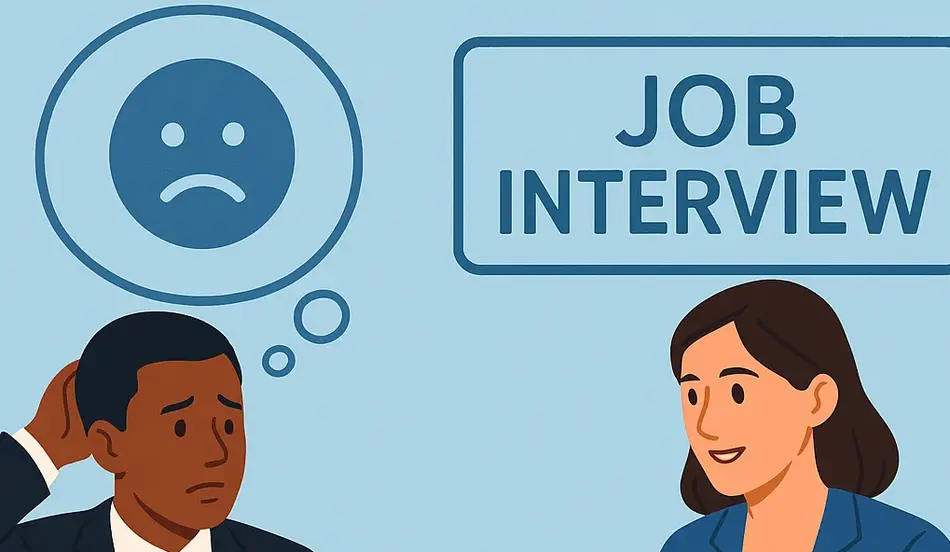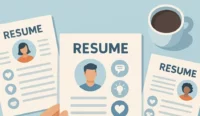The dreaded “What is your biggest weakness?” question continues to be one of the most challenging parts of job interviews. According to recent surveys, over 80% of hiring managers still ask this question, and many candidates report that their response to this particular question significantly impacted their interview outcome.
This comprehensive guide provides you with 11 strategically crafted job interview weaknesses that will impress hiring managers rather than raise red flags. By understanding why interviewers ask this question and how to frame your response effectively, you’ll transform this potential stumbling block into an opportunity to showcase your self-awareness and growth mindset.
Why Hiring Managers Ask About Your Weaknesses
Understanding the psychology behind this challenging question is the first step to crafting an effective response. There are two primary reasons why interviewers want to hear about your job interview weaknesses:
1. They’re Testing Your Honesty
Hiring managers know that everyone has weaknesses. When candidates claim they have none, it immediately signals dishonesty or a concerning lack of self-awareness. According to a LinkedIn survey of hiring professionals, 79% of recruiters consider authenticity a crucial factor in hiring decisions.
Acknowledging your weaknesses demonstrates integrity—a quality employers value highly. The key is selecting a weakness that doesn’t undermine your ability to perform the job while showing you’re honest enough to recognize your limitations.
2. They’re Assessing Your Self-Improvement Mindset
Beyond identifying weaknesses, interviewers want to see that you’re:
- Actively working to improve yourself
- Self-aware enough to recognize areas for growth
- Committed to professional development
- Able to turn weaknesses into strengths over time
Research from the Harvard Business Review shows that high-performing professionals are distinguished not by a lack of weaknesses but by their ability to recognize and address them constructively.
4 Weaknesses You Should NEVER Share in Job Interviews
Before diving into effective responses, let’s eliminate the job interview weaknesses that consistently lead to rejection:
1. “I’m a Perfectionist”
This cliché response signals to interviewers that you’re either:
- Unoriginal and haven’t prepared thoughtfully
- Attempting to disguise a strength as a weakness
- Unable to identify genuine areas for improvement
Hiring managers have heard this answer countless times and view it as an evasion rather than authentic self-reflection.
2. “I Get Nervous”
While honesty is important, highlighting anxiety or nervousness as your primary weakness raises immediate concerns about:
- Your ability to handle workplace pressure
- How you’ll perform in client-facing situations
- Whether you can manage team dynamics effectively
- Your confidence in high-stakes scenarios
3. “I’m a Workaholic”
This seemingly positive trait actually signals potential problems:
- Poor work-life balance leading to burnout
- Possible boundary issues with colleagues
- Inefficient time management
- Difficulty prioritizing tasks appropriately
Instead of claiming workaholism, consider framing this as “I sometimes struggle with work-life balance” if this genuinely applies to you.
4. “I Procrastinate”
Procrastination directly impacts job performance and is therefore one of the worst job interview weaknesses to mention. It suggests:
- Difficulty meeting deadlines
- Poor time management
- Potential reliability issues
- Lack of intrinsic motivation
11 Strategic Job Interview Weaknesses That Impress Hiring Managers
Now for the effective responses. Each of these job interview weaknesses demonstrates self-awareness while showing your commitment to improvement. Choose the one that most authentically reflects your experience:
1. Being Self-Critical
“My biggest weakness is being self-critical. I am my own worst critic. Although this weakness shows I care deeply about my work, I need to stop worrying if something doesn’t go exactly to plan and instead learn from the situation before moving forward.”
Why it works: This weakness shows conscientiousness and high standards without suggesting poor performance. Your improvement strategy demonstrates emotional intelligence.
2. Reluctance to Ask for Help
“My biggest weakness is I don’t like asking for help. In my last position, I struggled with a technical task and instead of consulting someone from another department, I spent excessive time researching solutions independently. While this stems from taking pride in my work, I’m now actively forcing myself to reach out for assistance when needed to improve efficiency.”
Why it works: This shows independence and determination while acknowledging the importance of teamwork and efficiency.
3. Difficulty Saying No
“My biggest weakness is finding it hard to say no to people. This sometimes results in taking on too many responsibilities simultaneously. While I’m eager to contribute and support my team, I’m learning to realistically assess my capacity before committing to additional tasks.”
Why it works: This weakness highlights your helpful nature and team-oriented mindset while showing you’re developing better boundary-setting skills.
4. Overinvestment in Projects
“My biggest weakness is struggling to let go of projects. I become so engrossed and passionate about my work that I sometimes lose sight of strict deadlines. To overcome this, I’m practicing signing off on projects as soon as they meet requirements and promptly transitioning to the next priority.”
Why it works: This weakness showcases your passion and commitment while demonstrating awareness of practical business constraints.
5. Public Speaking Anxiety
“My biggest weakness is public speaking. Despite thorough preparation for a presentation during college, nervousness significantly impacted my delivery. However, I’m eager to develop this skill and would welcome opportunities within your company to practice giving presentations to my team.”
Why it works: Many people share this common fear, making it relatable. Your willingness to improve demonstrates courage and growth orientation.
6. Risk Aversion
“My biggest weakness is discomfort with taking significant risks. I’ve traditionally been cautious in my approach, but I recognize that calculated risk-taking is essential for growth and innovation. I’m working on becoming more open to opportunities where potential benefits clearly outweigh the downsides.”
Why it works: This shows thoughtfulness and prudence while acknowledging the importance of appropriate risk-taking in business contexts.
7. Work-Life Balance Struggles
“My biggest weakness is maintaining healthy work-life boundaries. In my previous role, I regularly opened my laptop on weekends to complete additional work. However, I’ve recognized that proper rest directly impacts my productivity and creativity, so I’m now implementing stricter personal boundaries to ensure I bring my best self to work.”
Why it works: This demonstrates strong work ethic while showing maturity in understanding the importance of sustainability.
8. Reluctance to Provide Critical Feedback
“My biggest weakness is hesitating to give honest feedback. I tend to avoid potentially confrontational situations, which means I don’t always speak up when I notice areas for improvement. I recognize this isn’t conducive to effective teamwork, and I’m actively working to provide constructive feedback more regularly.”
Why it works: This shows you value harmony while recognizing the importance of honest communication for team growth.
9. Insufficient Delegation
“My biggest weakness is not delegating enough tasks. I prefer handling as much work personally as possible, which isn’t always efficient for team productivity. I’m now consciously allocating more responsibilities to team members based on their strengths to improve overall outcomes.”
Why it works: This demonstrates your willingness to take responsibility while showing growth in leadership capabilities.
10. Technical Knowledge Gaps
“My biggest weakness is limited experience with specific software packages required for peak performance in this industry. I’ve already scheduled dedicated time in the coming weeks to master these tools, which will enhance my efficiency and effectiveness in the role.”
Why it works: This practical weakness is easily addressable and shows proactive improvement without affecting core job capabilities.
11. Impatience
“My biggest weakness is impatience. I sometimes become frustrated when tasks take longer than anticipated or when waiting for information from others. I’m addressing this by developing better communication strategies to encourage efficiency while offering assistance to help move projects forward constructively.”
Why it works: This shows your results-oriented nature while demonstrating awareness of the importance of teamwork and process.
How to Structure Your Weakness Response
When discussing your job interview weaknesses, follow this three-part structure for maximum effectiveness:
- Name the genuine weakness – Be specific and honest
- Provide brief context – Explain how this has manifested in professional settings
- Describe your improvement strategy – Detail specific steps you’re taking to address the weakness
This approach demonstrates self-awareness, honesty, and a commitment to growth—precisely what hiring managers are looking for in your response.
FAQ: Navigating the Weakness Question in Job Interviews
How many weaknesses should I prepare for a job interview?
Prepare at least 3-5 different job interview weaknesses and corresponding improvement strategies. While you’ll typically only need to discuss one, having multiple options allows you to choose the most appropriate weakness based on the specific role and company culture.
Should my job interview weakness be related to the position I’m applying for?
Ideally, your weakness should not directly impact your ability to perform core job functions. For technical positions, avoid mentioning weaknesses related to critical technical skills. For customer service roles, avoid weaknesses related to communication or interpersonal abilities.
Is it better to mention past weaknesses that I’ve already overcome?
While discussing a fully resolved weakness might seem strategic, it can appear evasive. Instead, choose a genuine current weakness that you’re actively working on but that doesn’t prevent you from performing the job effectively. This demonstrates ongoing growth and authenticity.
How can I determine which job interview weakness is appropriate for a specific position?
Research the company culture and carefully review the job description to identify essential versus secondary skills. Your weakness should ideally relate to a non-critical aspect of the role. For example, if the position is primarily independent work, mentioning that you’re working on public speaking would be appropriate.
Should I use the same weakness for every job interview?
No. Tailor your response to each specific position. Different roles prioritize different skills, so the weakness that’s acceptable for one position might be problematic for another. Always consider the core requirements of the role before selecting which weakness to share.






